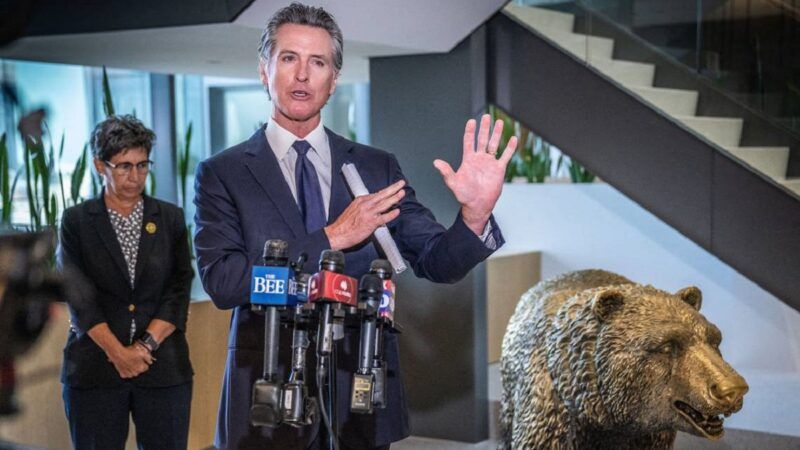Are Gavin Newsom's Presidential Aspirations Limiting His Progressive Instincts?
He insists that he's not running for president, but his vetoes of the fringiest measures suggest otherwise.

If you're like me and simply want the government to leave us alone and tend to its basic tasks—providing public services, building infrastructure, etc.—then you no doubt follow every legislative session with foreboding. Progressive Democrats who control California are intent on regulating our lives and raising our taxes, which leads to a sense of vulnerability as hundreds of intrusive bills head to the governor's desk.
This year, however, Gov. Gavin Newsom pulled a few surprises. He insists that he's not running for president, but his vetoes of the fringiest measures suggest his promises aren't ironclad. He rejected nearly 20 percent of bills that reached his desk, which is an "unusually large percentage," per CalMatters. Many veto messages, it noted, include boilerplate language warning that some bills would add to the state's deficit. He seems to be channeling his predecessor, deficit-weary Jerry Brown.
Here are some of the main examples. Newsom vetoed a measure requiring public schools to provide free, easily available condoms to students. His budgetary argument was a stretch, but any governor with national aspirations wouldn't want such baggage. Can you see the TV ads from his opponents had he signed it? Likewise, with his veto of Amsterdam-like cannabis cafes and a measure that would have decriminalized some psychedelic drugs.
He also nixed a bill to provide one week of severance to laid-off grocery store workers for every year of work, noting that state law already provides myriad layoff protections. He rejected a cap on insulin co-pays, explaining the state already is working on a plan to lower costs. His veto of a ban on caste discrimination came with the sensible explanation that such discrimination already is illegal.
Newsom rejected a ludicrous bill that would have created a state agency to build and manage government-owned housing. He again raised the cost argument, but anyone who has followed the sordid history of public-housing projects in America would quickly realize that the government can't fix our state's housing woes (although it can make them worse)—and would produce terribly managed high-rise slums.
Sure, unions scored expected legislative victories, but Newsom at least vetoed a bill giving striking workers unemployment benefits—something that would have overburdened a system already facing insolvency. The governor rejected cash payments up to $1,900 a month for undocumented seniors—another decision that makes sense in the context of a national political campaign.
Progressives were understandably disappointed, but that should only hearten the rest of us. "While a lot of these bills may not fly in the Deep South, they're unremarkable in progressive California, and were on Newsom's desk in the first place because the state Legislature put them there—ostensibly carrying out the will of California voters," lamented CNN columnist Jill Filipovic. Yes, legislators put them there, but elected governors have the final say regarding the "will of the people." That's how our system works.
Newsom mostly vetoed bills that would have provided immense pushback for little gain. I have nothing against legalizing psychedelics, but critics far outnumbered beneficiaries. Newsom did sign several noxious measures. He OK'd a bill making it harder for landlords to evict troublesome tenants. He required companies to disclose greenhouse gas emissions. He banned certain food additives. That's par for the course in progressive California.
Newsom also signed a bill allowing Capitol staffers to join a union beginning in 2026. State workers belong to unions, but legislative workers are unique. Legislators need the flexibility to hire whomever they choose to implement their agenda. These mostly are political positions, with a high churn rate—not career jobs. I chuckle at that one for mischievous reasons, as it might remind union-friendly lawmakers of the burdens they place on other employers. I bet lawmakers will regret this one.
On the good-news front, Newsom signed a massive package of 56 bills to incentivize housing construction. Most notably, Senate Bill 423 streamlines housing approvals in coastal cities (reducing the power of the anti-growth California Coastal Commission) and applies loosened regulations to market-rate projects. Senate Bill 4 allows universities and religious groups to build—on a by-right basis—housing on their property.
Newsom touted a term I've never heard before: YIGBY (Yes In God's Back Yard). That's weird, but it probably will result in additional new housing. God bless him for that signing. He even signed legislation that clarifies the California Environmental Quality Act, thus making it harder for local NIMBY governments to abuse CEQA to limit housing approvals.
In his statement, Newsom quoted Sen. Scott Wiener (D–San Francisco), who is the driving force behind pro-housing reforms: "The era of saying no to housing is coming to an end. We've been planting seeds for years to get California to a brighter housing future, and today we're continuing strongly down that path." May it be so.
So it's been a less bad legislative session than expected. I still feel relief it's over.
This column was first published in The Orange County Register.


Show Comments (29)